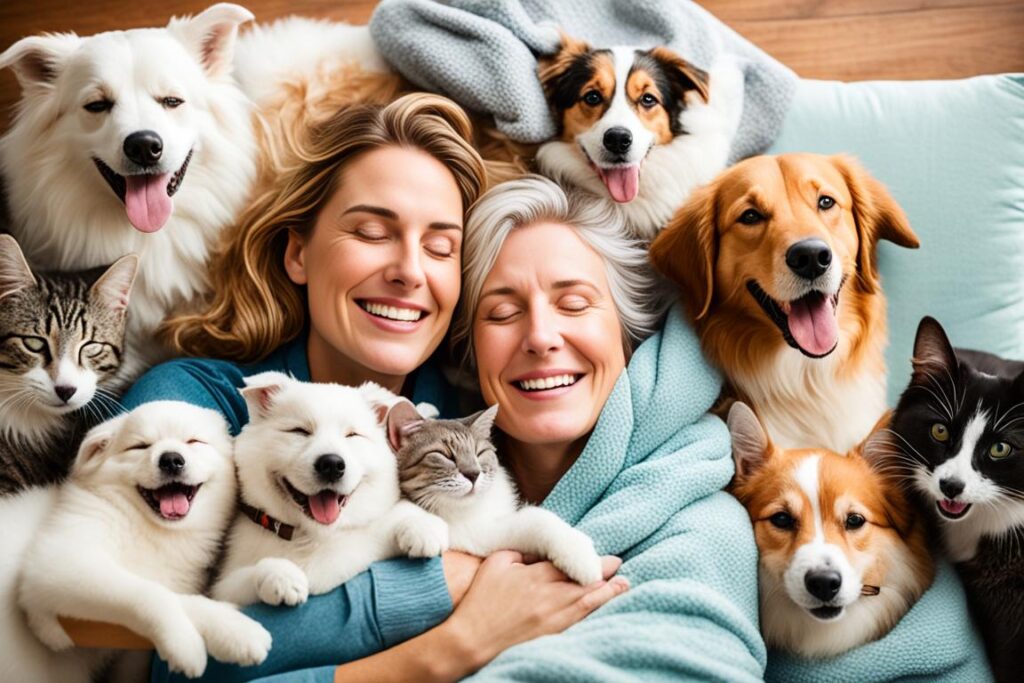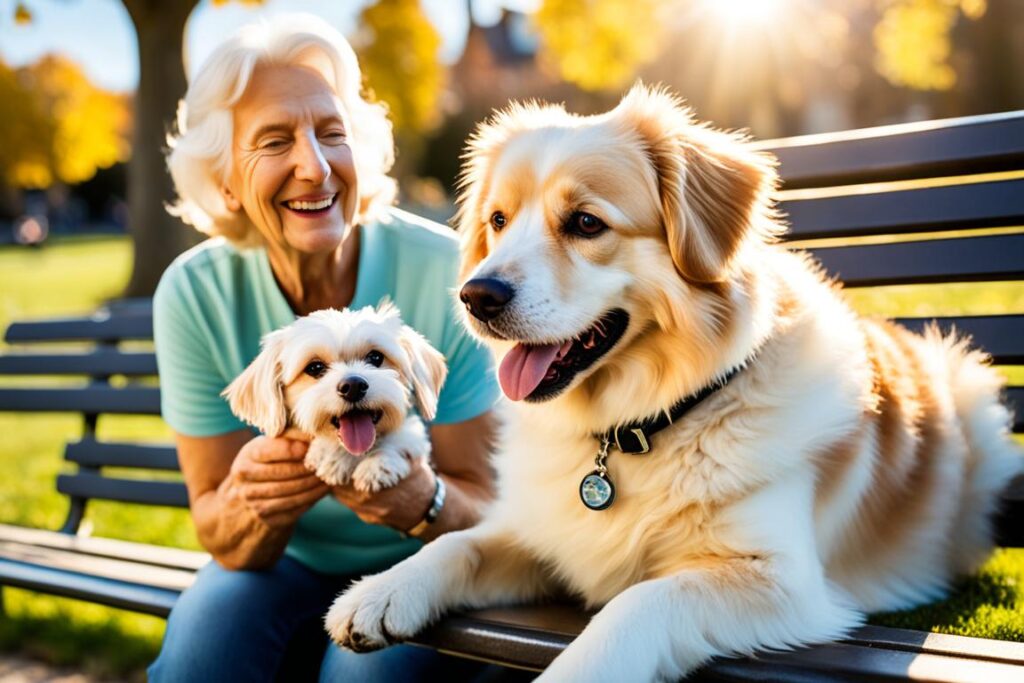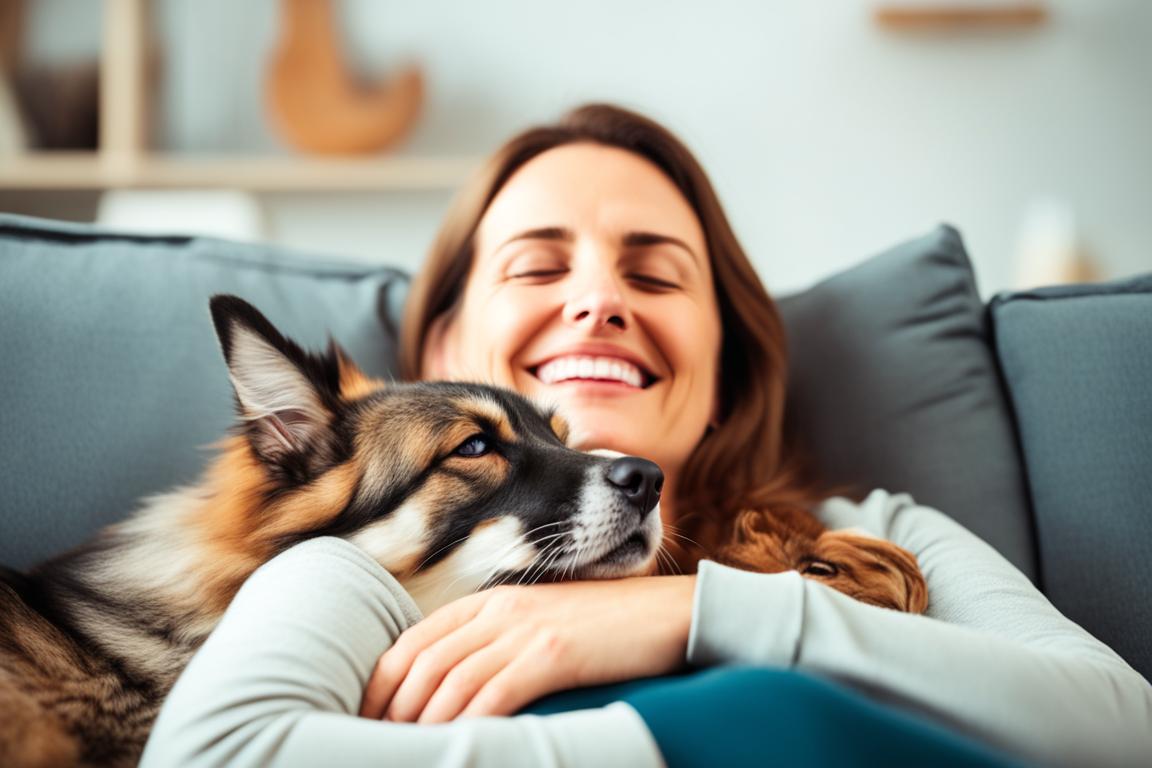The Special, Unbreakable Bond of a Pet and Their Parent!
Owning a pet is more than just having a furry friend. It’s about forming a special and unbreakable bond with a loyal companion. The relationship between a pet and their parent is built on love, trust, and mutual understanding. Whether you have a dog, cat, or any other pet, the joy and happiness they bring into your life are immeasurable. Pets become a part of the family, providing unwavering companionship and support. This bond goes beyond words and creates a unique connection that can only be understood by pet parents themselves.
Key Takeaways:
- The bond between a pet and parent is special and unbreakable.
- Pets bring joy, companionship, and support to the lives of their parents.
- Pets become part of the family and create a unique connection.
- This bond goes beyond words and is only understood by pet parents.
- Companionship with pets enriches and enhances our lives.
Exploring the Depth of Pet Companionship
Pet companionship is a profound experience that brings immense joy and fulfilment. Pets have an incredible ability to understand and connect with their parents on a deep emotional level. They provide unconditional love, loyalty, and companionship, becoming a source of comfort and solace in times of need. The relationship between a pet and their parent is built on trust and mutual affection, creating a bond that is truly special. Exploring the depth of pet companionship reveals a world of love and devotion that is unparalleled.
The Joy of Pet Parenthood
Understanding the emotional connections that come with pet parenthood is key to appreciating the joy it brings. Pets have a unique ability to sense their parent’s emotions and provide comfort during difficult times. They can also sense happiness and bring joy to their parent’s life. Having a pet has been shown to reduce stress, improve mental health, and enhance overall well-being.
Understanding the Emotional Connections
When you bring a pet into your life, you embark on a journey filled with love and companionship. Pets have an incredible knack for understanding their parent’s emotions. They can sense when you’re feeling sad, offering you comfort and solace. With their unconditional love, pets provide an emotional connection that words cannot express.

How Pets Enhance Your Daily Life
Pets have a profound impact on our daily lives. Their companionship brings joy and laughter, brightening even the darkest of days. Whether it’s the enthusiastic wag of a tail or the gentle purring of a cat, pets have a way of uplifting our spirits. They provide a sense of purpose and responsibility, creating a routine that adds structure and meaning to our lives.
Stories of Lifelong Friendships
The friendships we form with our pets can last a lifetime. The memories we create, the adventures we embark on, and the unconditional love we receive are immeasurable. Countless stories highlight the lifelong friendships between pets and their parents, showcasing the profound impact pets have on our lives. These stories provide a testament to the deep bond that forms between humans and animals, reminding us of the joy and fulfillment that comes with pet parenthood.
Navigating the Responsibilities of Pet Ownership
Pet ownership brings immense joy and companionship, but it also comes with a set of responsibilities that should not be taken lightly. As a pet parent, it is essential to understand and fulfill these responsibilities to ensure the well-being and happiness of your furry friend.
Caring for a pet involves meeting their basic needs, including providing them with proper food, clean water, and a safe and comfortable shelter. Regular feeding and scheduled mealtimes help establish a routine and maintain their health. It’s important to choose high-quality pet food that meets their nutritional requirements.
Another crucial aspect of pet ownership is ensuring their physical and mental well-being. Regular exercise and playtime are vital for a pet’s overall health. Dogs benefit from daily walks and interactive games, while cats enjoy toys and scratching posts to satisfy their natural instincts.
Providing your pet with proper medical care is also a responsibility of pet ownership. Regular veterinary check-ups, vaccinations, and preventive treatments such as flea and tick control are essential to keep your pet healthy and protected from diseases.
Mental stimulation is equally important. Engage your pet in activities that challenge their minds, such as puzzle toys or training sessions. This helps prevent boredom and encourages their natural curiosity and intelligence.
Navigating the responsibilities of pet ownership requires commitment, time, and effort. However, the rewards of having a happy and healthy pet are immeasurable. By fulfilling these obligations, you are ensuring that your pet lives a fulfilling life and that your bond with them grows stronger each day.
Pet Happiness: More Than Just a Wagging Tail
Pet happiness is a vital aspect of their well-being and overall contentment. It is more than just a wagging tail; it encompasses a range of signs that indicate a pet’s happiness and fulfillment. By understanding these signs, pet parents can create an environment that promotes their pet’s happiness and enhances their bond. When a pet feels loved, safe, and fulfilled, their happiness shines through in various ways:
- A Relaxed Posture: A happy pet will often exhibit a relaxed body posture. Their muscles will be loose, and they won’t show signs of tension or stress.
- Bright Eyes: Happiness is reflected in a pet’s eyes. Their eyes will appear bright, alert, and free from any indications of fear or anxiety.
- A Playful Attitude: A joyful pet will engage in play, showing enthusiasm and excitement. They will actively seek out opportunities for fun, such as playtime with toys or interactions with their pet parent.
These signs of pet happiness are indicative of a contented and well-adjusted companion. To ensure your pet’s well-being, it’s essential to meet their physical, emotional, and social needs. Providing them with a balanced diet, regular exercise, mental stimulation, and plenty of affectionate interactions will contribute to their overall happiness and contentment.
Additionally, understanding and responding to your pet’s body language and vocal cues can help you gauge their emotions and tailor their care accordingly. As a responsible pet parent, it’s crucial to create a nurturing and loving environment that supports their happiness and well-being.

Pet Care Tips for a Healthy Companionship
Taking care of your pet’s health is vital for a happy companionship. By following these pet care tips, you can ensure that your furry friend stays healthy and well-cared for.
Regular Veterinarian Visits
Regular visits to the veterinarian are essential in maintaining your pet’s overall health. Your veterinarian can provide necessary vaccinations, perform preventive care, and conduct screenings to catch any potential health issues early on. These visits also give you the opportunity to discuss any concerns or questions you may have about your pet’s well-being.
Nutritional Advice for Optimum Health
A balanced and nutritious diet is crucial for your pet’s well-being. Consult your veterinarian for specific dietary requirements based on your pet’s age, breed, and health condition. They can recommend high-quality pet food that meets your pet’s nutritional needs. It’s important to provide fresh water at all times and avoid feeding them harmful foods that can be toxic to pets.
Mental Stimulation and Physical Exercise
Mental stimulation and physical exercise are essential for keeping your pet happy and healthy. Engaging your pet in activities that challenge them mentally, such as puzzle toys or training sessions, can help prevent boredom, stimulate their cognitive abilities, and reduce behavioral problems. Physical exercise is equally important and should include regular walks, playtime, and interactive games to keep them physically active and maintain a healthy weight.
Understanding Pet Behaviour
Understanding pet behaviour is key to fostering a strong relationship with your furry friend. Pets communicate through body language, vocalizations, and behaviours, all of which provide valuable insights into their emotions. Learning to interpret these cues allows pet parents to understand their pet’s needs, feelings, and desires. It is essential to recognize signs of fear, stress, or discomfort, as well as the behaviours that indicate happiness, comfort, and contentment.
Pets have their unique ways of expressing themselves and communicating with their owners. The body language of pets can reveal a lot about their current emotional state. For example, a relaxed posture, bright eyes, and a wagging tail are signs of happiness and contentment. On the other hand, flattened ears, a tucked tail, or a hunched back can indicate fear, stress, or discomfort.
Interpreting pet body language involves paying attention to various cues such as facial expressions, ear positions, tail movements, and overall body posture. Each pet may have their unique signals, so it’s essential to spend time observing and understanding your pet’s specific behaviours and reactions in different situations.
Vocalizations, such as barking, meowing, or purring, also play a significant role in pet communication. Different sounds and tones can convey different meanings, and pet parents can learn to distinguish between a happy purr, a playful bark, or a distressed cry.
By understanding and interpreting your pet’s behaviours and emotions, you can provide the appropriate care, support, and environment they need to thrive. It allows you to address any potential issues or discomfort they may experience and ensure their overall well-being and happiness.
Below is an image that showcases different pet behaviours and body language cues:
Creating a Pet-Friendly Household
Creating a pet-friendly household is essential to ensure the safety and comfort of your furry companion. By implementing a few key strategies, you can create an environment that promotes your pet’s well-being and happiness.
Safe Spaces and Comfort Zones
Providing designated safe spaces and comfort zones is important for your pet to have a place to retreat when they feel overwhelmed or need some quiet time. These areas should be quiet, comfortable, and easily accessible to your pet. Consider creating cozy corners or using pet beds where they can relax and feel secure.
Keeping Hazards at Bay
Pet-proofing your home is crucial to protect your pet from potential hazards and accidents. Take the time to secure loose wires, cover electrical outlets, and use baby gates to block off areas that could be unsafe. Store medications, cleaning products, and foods that are toxic to pets out of their reach. Regularly inspect your home for any potential dangers, such as small objects that could be swallowed, and address them promptly.
Incorporating Fun and Play
Incorporating fun and play into your pet’s environment is vital for their mental and physical stimulation. Provide them with interactive toys, scratching posts, or climbing trees to keep them engaged. Set aside time each day for playtime and ensure that they have a variety of toys to keep them entertained. Engaging in regular play sessions is not only enjoyable for your pet but also strengthens the bond between you and your furry friend.

Creating a pet-friendly household involves careful consideration of your pet’s safety, comfort, and need for playtime. By implementing these strategies, you can provide an environment that promotes their well-being and enhances the bond between you and your pet.
Responsible Pet Ownership in Action
Responsible pet ownership is the cornerstone of ensuring the welfare and well-being of your pet. It goes beyond providing food and shelter, encompassing informed decision-making, proper care, and advocacy for animal welfare. As a responsible pet parent, you play a crucial role in the lives of your furry friends, making choices that prioritize their health and happiness.
One aspect of responsible pet ownership is making informed decisions about pet adoption. By adopting pets from reputable shelters or rescue organizations, you contribute to reducing pet overpopulation and giving deserving animals a second chance. Adoption provides a loving home to pets in need and helps combat the issue of pet homelessness.
Another vital consideration is responsible breeding. If you choose to purchase a pet from a breeder, it is essential to do thorough research and select responsible breeders who prioritize the health, temperament, and genetic diversity of their animals. By supporting responsible breeding practices, you help ensure the long-term welfare of specific breeds and reduce the prevalence of genetic disorders.
Responsible pet parents understand the importance of certain medical procedures such as spaying/neutering and microchipping. Spaying/neutering not only helps control pet overpopulation but also offers numerous health benefits for your pet, including a reduced risk of certain cancers. Microchipping provides a permanent form of identification, increasing the chances of reuniting lost pets with their families.
Creating a nurturing and loving environment is paramount in responsible pet ownership. It involves providing proper nutrition, regular exercise, socialization opportunities, and mental stimulation to ensure your pet’s overall well-being. Regular visits to the veterinarian for check-ups, vaccinations, and preventive care are also crucial.
Advocacy for animal welfare is an integral part of responsible pet ownership. Supporting initiatives and organizations that work towards improving the lives of all pets helps create a better future for animals. By spreading awareness, promoting responsible pet ownership, and participating in volunteer activities or fundraising efforts, you contribute to the welfare of pets in your community.
Responsible pet ownership is more than just fulfilling the basic needs of your pet. It is about taking an active role in their lives, making informed decisions, and prioritizing their welfare. By embodying responsible pet ownership, you set an example for others, ensuring that pets receive the care and love they deserve, now and in the future.
Pet Parenting Guide: Fostering a Strong Bond
Fostering a strong bond with your pet requires consistent effort and clear communication. By following a pet parenting guide, you can strengthen the bond with your furry friend and enhance your relationship. Here are three essential factors to consider:
The Role of Consistency and Routine
Consistency and routine play a vital role in shaping your pet’s behavior and ensuring their well-being. Establishing a consistent daily routine helps pets feel secure and know what to expect. This includes consistent feeding times, playtime, and exercise. By providing a structured environment, you create a sense of stability and security, fostering a stronger bond with your pet.
Communication and Understanding Signals
Effective communication is key to understanding your pet’s needs and desires. Pets communicate through their body language, vocalizations, and signals. Take the time to learn and interpret these cues, which will enable better communication and a deeper understanding of your pet’s emotions. This understanding allows you to respond appropriately and meet their needs, further strengthening your bond.
The Importance of Quality Time Together
Spending quality time with your pet is essential for building a strong bond. Engage in activities that you both enjoy, such as playing, grooming, or going for walks. This dedicated time together provides opportunities for bonding, creates positive associations, and deepens your connection. Show love, affection, and attention to your pet during these moments, reaffirming your bond and cementing your role as their trusted parent.
To further enhance the bond with your pet, remember to be patient, consistent, and understanding. Each pet is unique, and it may take time to establish a strong bond. With consistent effort, clear communication, and quality time together, you can strengthen your pet bond, creating a lifelong companionship.
Enrichment Activities for Pet and Parent
Enrichment activities are essential for keeping your pet mentally stimulated and engaged. These activities provide mental challenges that help prevent boredom and improve cognitive abilities, ensuring a happy and healthy pet. By participating in interactive games and puzzles, you can provide your pet with valuable mental stimulation while strengthening the bond between you.
Interactive Games and Puzzles
Interactive games and puzzles are a great way to engage your pet’s mind and encourage problem-solving skills. Hide treats or toys around the house for your pet to find, providing them with a fun and rewarding challenge. You can also invest in interactive toys that require your pet to solve puzzles to access treats. These activities not only keep your pet entertained but also provide mental stimulation that helps keep their mind sharp.
Outdoor Adventures and Socialisation
Outdoor activities are a fantastic way to provide enrichment for your pet. Taking your pet for walks, hikes, or trips to the park allows them to explore new environments, experience different smells, and interact with other animals. This exposure to new stimuli is mentally stimulating and provides valuable socialization opportunities, helping to keep your pet happy and well-adjusted.
Training Challenges to Strengthen Bonds
Training your pet not only teaches them valuable skills but also strengthens the bond between you. Engaging in training challenges together creates opportunities for communication, trust-building, and bonding. Consider enrolling your pet in obedience classes or teaching them fun tricks and commands at home. The process of training promotes mental stimulation, enhances their overall behavior, and deepens the connection between pet and parent.
Conclusion
The special bond between a pet and their parent is an extraordinary and unbreakable connection. Pet parenthood brings immense joy, love, and companionship into our lives. It requires responsibility, care, and a deep understanding of our furry friends. By investing time and effort, we can create a nurturing and fulfilling environment for our pets, strengthening the bond and creating a lifetime of cherished memories. The joy of pet parenthood is a beautiful journey filled with love, laughter, and unforgettable moments.
As pet parents, we have the privilege of experiencing the unconditional love and loyalty that only comes from our beloved companions. From their expressive eyes to their wagging tails, pets remind us of the simple joys in life and teach us valuable lessons about compassion and empathy. They are there for us through the ups and downs, providing comfort when we need it most and celebrating our victories with unbridled enthusiasm. Our pets offer us a unique sense of purpose and companionship that nourishes our souls.
Remember, the bond between you and your pet is irreplaceable. It requires patience, understanding, and a commitment to their well-being. Whether it’s a playful romp in the park, a quiet cuddle on the couch, or simply being present in each other’s company, every moment spent together deepens the connection. Embrace the joy and wonder that pet parenthood brings, knowing that you are creating a treasured bond that will last a lifetime. Treasure the memories, celebrate the milestones, and cherish the unconditional love that only a pet can provide. Your journey as a pet parent is a remarkable gift that will enrich your life in ways you never thought possible.
FAQ
What is the special bond between a pet and their parent?
The special bond between a pet and their parent is built on love, trust, and mutual understanding. It is a unique connection that goes beyond words and can only be understood by pet parents themselves.
How do pets enhance daily life?
Pets enhance daily life by providing unconditional love, loyalty, and companionship. They have the ability to sense their parent’s emotions and bring joy and comfort during difficult times. Having a pet can also reduce stress, improve mental health, and contribute to overall well-being.
Are there any stories of lifelong friendships between pets and their parents?
Yes, there are countless stories of lifelong friendships between pets and their parents. These stories showcase the profound impact that pets can have on our lives and the deep connections that can be formed.
What are the responsibilities of pet ownership?
Pet ownership responsibilities include providing food, water, shelter, and medical care for your pet. It also involves regular exercise, mental stimulation, and ensuring their overall well-being.
How can I ensure my pet’s happiness?
Pet happiness goes beyond a wagging tail. You can ensure your pet’s happiness by meeting their physical, emotional, and social needs. This includes providing love, safety, a balanced diet, mental stimulation, and physical exercise.
How often should I take my pet to the veterinarian?
Regular visits to the veterinarian are essential for your pet’s health. This ensures they receive necessary vaccinations, preventive care, and screenings. Your veterinarian will guide you on the appropriate frequency for your pet’s specific needs.
How can I understand and interpret my pet’s behavior?
Understanding pet behavior involves learning to interpret their body language, vocalizations, and behaviors. This allows you to understand their needs, emotions, and desires. It is important to recognize signs of fear, stress, or discomfort, as well as behaviors that indicate happiness, comfort, and contentment.
How can I create a pet-friendly household?
To create a pet-friendly household, provide designated safe spaces and comfort zones for your pet. Pet-proof your home to protect them from hazards and accidents. Incorporate fun and play into their environment to promote mental and physical stimulation.
What does responsible pet ownership entail?
Responsible pet ownership involves prioritizing your pet’s welfare and well-being. This includes making informed decisions about pet adoption, choosing reputable breeders, and providing proper care throughout their lives. Responsible pet parents also advocate for animal welfare and support initiatives that improve the lives of pets.
How can I foster a strong bond with my pet?
Fostering a strong bond with your pet includes establishing a consistent routine and rules to help them feel secure. Effective communication involves understanding their body language, vocalizations, and signals. Spending quality time together, engaging in activities, and showing affection also deepens the bond between pet and parent.
What are some enrichment activities for pets?
Enrichment activities, such as interactive games and puzzles, provide mental challenges to prevent boredom and improve cognitive abilities. Outdoor adventures and socialization opportunities allow pets to explore new environments, meet other animals, and interact with their surroundings. Training challenges not only teach pets valuable skills but also create bonding opportunities between pet and parent.
In conclusion, what is the joy of pet parenthood?
The joy of pet parenthood is a beautiful journey filled with love, laughter, and unforgettable moments. It involves forming a special bond with a loyal companion and experiencing the profound impact pets can have on our lives. Through responsible pet ownership, we create a nurturing and fulfilling environment for our pets, strengthening the bond and creating a lifetime of cherished memories.

